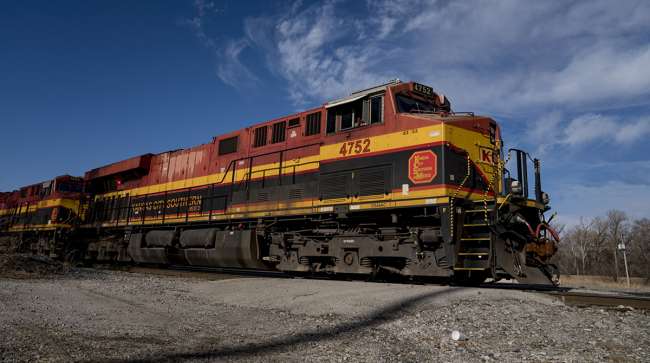Senior Reporter
Kansas City Southern Reports Mixed Q4 Earnings

[Stay on top of transportation news: Get TTNews in your inbox.]
Kansas City Southern reported a higher fourth quarter and higher annual net income, but lower revenue for the period.
The Class I railroad said Jan. 22 that net income was $166.3 million, or $1.81 a share, in the last three months of 2020 compared with $127.2 million, or $1.31.
Revenue slipped to $693.4 million from $729.5 million in 2019.

Ottensmeyer
“Despite several significant challenges in the fourth quarter, including continued impacts from the pandemic, weather events, and an extended outage from illegal protests on segments of our network in Mexico, Kansas City Southern delivered strong fourth-quarter results,” President Patrick Ottensmeyer said.
For the year, the railroad reported net income of $619.1 million, or $6.57, compared with $540.8 million, or $5.42, the year before.
Revenue was $2.63 billion compared with $2.866 billion in 2019.
The company’s fourth quarter and annual operating ratio also improved. The fourth quarter was 62.2 compared with 67.6 in 2019. For the year, the railroad said its operating ratio was 61.9 versus 69.1 the year before.
The operating ratio measures a company’s operating expenses as a percentage of revenue and determines efficiency. The lower the ratio, the greater the company’s ability to generate a profit.
Railroad officials said yearly carloads were down 6% when measured against 2019, and a series of events in 2020, including the coronavirus pandemic, contributed to the lower results.
Still, company officials were optimistic they have weathered the worst of the economic downturn.
“We are overcoming the adversity that we faced in the fourth quarter and throughout 2020, and we heighten our focus on Precision Scheduled Railroading-driven service improvements to realize the significant growth opportunities that we see going forward,” said Ottensmeyer.
Kansas City Southern is one of several Class I railroads that have aggressively moved to become more efficient by utilizing precision scheduled railroading. The business principle involves moving freight with fewer railcars and locomotives using a more simplified, direct line of transport across the network.
On a conference call with reporters, the company said it intends to keep pursuing higher efficiency, and its goal is an operating ratio between 55 and 56 by 2022.
“As we turn our focus to 2021, our primary objective will be the implementation of PSR Phase 3, which combines improved operational performance with an intense focus on customer service and revenue growth,” Ottensmeyer said.
The railroad said PSR saved $96 million in 2020, and another $50 million is anticipated in 2021.
The company’s employee compensation and benefits fell 11% in the fourth quarter to $121.9 million from $137.1 in 2019.
Last year, the company spent 9.9% less at $476.5 million on compensation and benefits, compared with $529.1 million in 2019.

Sustainable trucking is here. In this episode, we'll talk to two major players in the transportation technology sector that are helping fleets move closer to total supply chain sustainability. Hear a snippet, above, and get the full program by going to RoadSigns.TTNews.com.
KCS is the only Class I running a dedicated Mexican freight route through an agreement with the Mexican government. The majority of the rail system spans from the Valley of Mexico to the U.S. border at Laredo, Texas. There also are tracks connecting to the port cities of Lázaro Cárdenas and Veracruz.
The railroad’s intermodal and automotive segments may have been affected by the service interruption at Lázaro Cárdenas in Mexico due to teachers protests.
The company said fourth-quarter revenue from shipping chemicals and petroleum products increased 15% to $214.8 million from $186.1 million in 2019.
Quarterly industrial and consumer revenue dipped by 15% to $131.7 million compared with $154.4 million in 2019.
Agriculture and mineral shipments increased 3% to $131.2 million from $127.3 million.
Energy shipments, including coal, declined 16% to $52.6 million from $62.7 million a year ago.
Intermodal revenue dropped 20% to $77.8 million from $97.2 million, and automotive shipment revenue declined 4%, to $54.7 million from $62.3 million.
Much of the drop in automotive revenue is being attributed to Mexico’s labor situation and the protests involving the teachers.
Want more news? Listen to today's daily briefing:
Subscribe: Apple Podcasts | Spotify | Amazon Alexa | Google Assistant | More

